
This video demonstrates at home make and beak word literacy strategies that you can do at home with your kids.
- Subject:
- English Language Arts
- Material Type:
- Teaching/Learning Strategy
- Author:
- Heather Phillips
- Date Added:
- 03/17/2021

This video demonstrates at home make and beak word literacy strategies that you can do at home with your kids.

The Observation Survey includes 6 tasks:
Letter Identification - Students are asked to identify capital and lower case letters in any way they can.
Word Test - Students read a list of 20 words.
Concepts about Print - This task identifies what children know about how print works.
Writing Vocabulary - Students are given 10 minutes to write as many words as they can.
Hearing and Recording Sounds in Words- A short story is dictated and students are asked to record the sounds they hear.
Text Reading - Students are asked to read text and their level is identified

Talk for Writing is an engaging teaching framework developed by Pie Corbett, supported by Julia Strong. It is powerful because it is based on the principles of how children learn. It enables children to imitate the language they need for a particular topic orally, before reading and analysing it, and then writing their own version.

Great games and activities for reading and math for kids aged 3 to 11. This site is targeted at parents and children, and can easily be used for free at home.

This website hosts a variety of resources related to the science of reading.
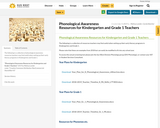
The following is a collection of phonological awareness resources teachers may find useful when setting up their early literacy programs in Kindergarten and Grade 1.

PreK-12 Education, Early Learning and Schools
"Play. Learn. Grow. Together!" is a way to reach out to parents of newborn and Kindergarten-aged children with tips and information on how to help them learn at home.
Play. Learn. Grow. Together! debuts with a new website, interactive social media presence and series of informational videos to get parents thinking about simple and easy ways they can interact with their young child to assist in their development and education. Additional tips and videos from our team of early learning experts will be added over time, allowing Play. Learn. Grow. Together! to evolve into a long term, reliable source of early years educational advice."
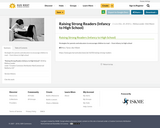
Strategies for parents and educators to encourage children to read — from infancy to high school
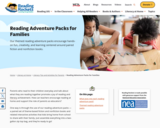
What goes into each reading adventure pack?
Parent information sheet with an introductory note that you can personalize, instructions about how to use the packet, and tips for sharing fiction and nonfiction books with children.
Two books: one fiction and one nonfiction, selected by Reading Rockets for high quality and wide availability in school libraries
Creativity Activity: a hands-on craft project
Imagination Activity: encourages imaginative play, writing, or drawing
Get Real Activity: focuses on real-world experiences for parent and child
Bookmark: lists the featured titles and alternative titles
The Reading Rockets reading adventure packs contain the instructions, activities, and bookmarks for you to download and print, for free.
K-3 all subjects!
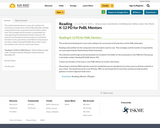
This professional development covers why reading is the cornerstone of all education and the PeBL philosophy.
Reading is demystified into the components that all students need to read. Then strategies and the transfer of responsibility are used supporting the Saskatchewan Reads framework.
The materials used through out the presentation are included in the folder for this presentation in the PeBL ELA Team group in the folder entitled "Reading PD (PeBL Mentor PD).
Contact any members of the team for further information.
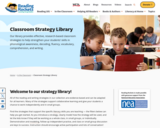
"Reading Rockets is a national multimedia project that offers a wealth of research-based reading strategies, lessons, and activities designed to help young children learn how to read and read better. Our reading resources assist parents, teachers, and other educators in helping struggling readers build fluency, vocabulary, and comprehension skills." On this page, find a list of research-based reading strategies, including videos of how to use them, templates, and examples. Explore the rest of the website as well- it offers countless strategies and professional learning opportunities!

-How To Choose A Book
-Themed Book Lists
-Canadian Children’s Book Awards
-Links
-Teacher’s Book Bank

The Saskatchewan Literacy Network is based in Saskatoon and connects with literacy organizations, literacy practitioners, and learners throughout the province.
Resources are available for literacy at home, work and in the community.
Be sure to select the "Literacy at Home" tab and then "Family Literacy Resources" to find useful information and booklets to help foster literacy at home.
Keep an eye on this site in January for information on FAMILY LITERACY WEEK.

The Ministry of Education continues to work with its human service partners to implement the plan by focusing on alignment and coordination of services across the early years sector. These actions are improving service responses for children and families, and supporting child development and school readiness outcomes.

Start your day with the Science of Reading! The free, downloadable Scarborough’s Reading Rope placemat is the perfect addition to your classroom table or desk.
Designed for educators who are passionate about research-based literacy practices, this placemat breaks Scarborough’s Reading Rope down into the key elements of skilled reading and includes quick teaching tips for integrating each into your instruction.

Susan Lambert is joined by Dr. Brittney Bills, educator and recent Science of Reading Star Award Winner to discuss MTSS. Dr. Bills began her journey as a school psychologist for six years before transitioning to the role of curriculum coordinator at Grand Island Public Schools. In this episode, Dr. Bills explains what MTSS is and how it centers on prevention rather than intervention. She talks about the intersection of universal screening data and MTSS and provides advice on evidence-based strategies and techniques to make a positive impact in your classroom. Using examples from her own district, Dr. Bills discusses avoiding burnout, learning to use data, and the process of ongoing improvement.

Early-childhood learning can help prepare students for better academic engagement. This Spotlight will help you discover how coding exercises can enhance preschooler’s academic skills; learn how to support young students’ language growth; understand the gaps in preschooler’s language development since the pandemic; examine the impact of early education programs on high school performance; investigate challenges facing school readiness; and evaluate Pre-K programs from multiple lenses.
Download the PDF file.
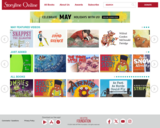
A great way to motivate kids to read.
The stories are read by celebrities.
After you watch the video of the book being read, the parent or teacher can download the teacher guide. It provides questions to ask your little reader, projects to go along with the book and websites to help kids further explore the topic. You can even purchase your favorite books directly from the site.
Cross-curricular connections are also made!
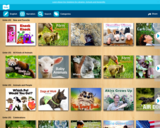
"Unite for Literacy pictures a world where all children have access to an abundance of books that celebrate their languages and cultures. With a goal of cultivating a lifelong love of reading, Unite for Literacy provides free digital access to picture books, narrated in many languages." (AASL)
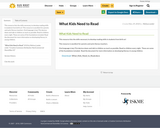
This resource lists the skills necessary to develop reading skills in students from birth on!
This resource is excellent for parents and early literacy teachers.
Oral language is key! Put devices down and talk to children as much as possible. Read to children every night. These are some of the foundations included. Read the document for more information on developing literacy in young children.